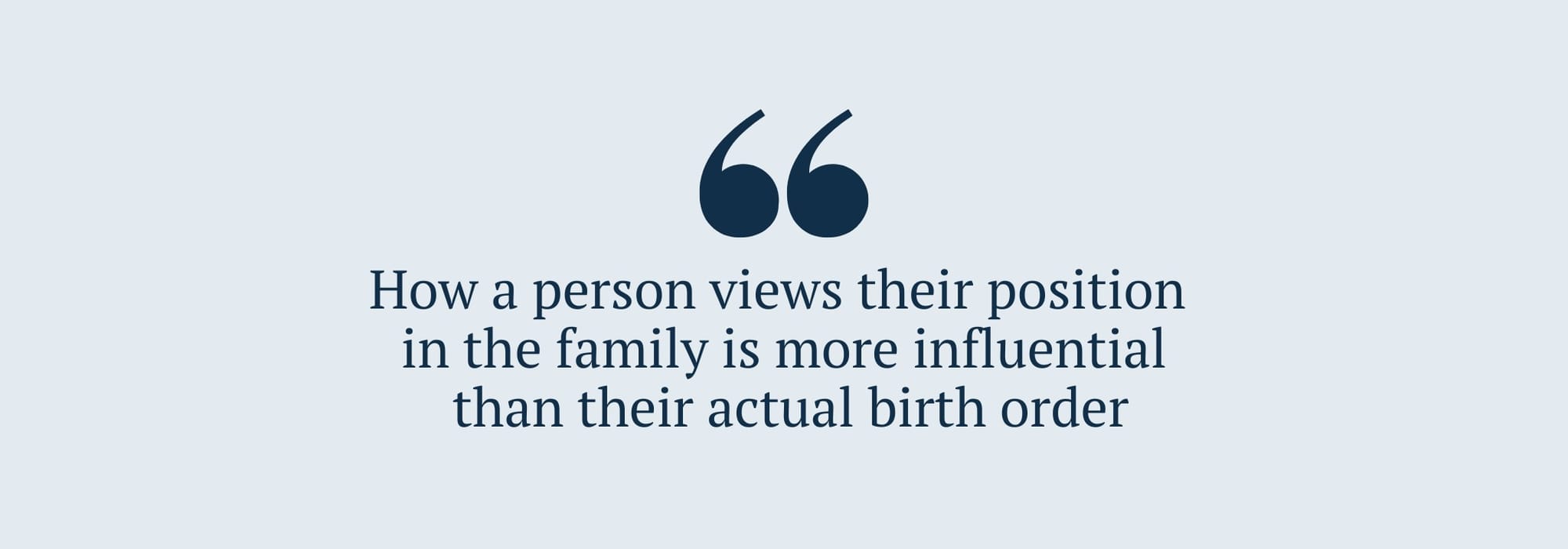Birth order bias or middle children breaking the mould? It’s time to put a spotlight on family dynamics and stereotypes
Have you heard the stereotype that all middle children are shy, well-behaved, people-pleasers? They’re not the oldest, who usually lead the way, nor the youngest, who can be spoiled as ‘the baby’ of the family. The middle child – so the theory goes – is starved of attention, learns to be hyper-independent, and bears the responsibility of peacemaker between siblings. It’s not considered a mental illness or a condition, simply a theory, and one that comes with decades of conflicting research.
Birth order theory
Middle child syndrome is best understood within the wider context of birth order theory. In the 1900s, Austrian psychotherapist Alfred Adler theorised that the order in which children are born into a family significantly influences their personality and development. Adler defined five clear roles in relation to his theory – the firstborn, secondborn, middle child, youngest, and only child – each with its own set of experiences that shape a person’s characteristics.
How much truth is in the theory?
Birth order theory has its fair share of sceptics. Despite the large number of studies on the topic, other variables (which we’ll explore further) influence self-development and personality far more consistently. Additionally, as highlighted in the Encyclopedia of Evolutionary Psychological Science, patterns shown in many studies tend to not be replicable or consistent from study to study, making results inconsistent and unreliable.
And the ‘lore’ around what it means to be a middle child may be fuelled by unsubstantiated tropes. Counsellor and psychotherapist Lisa Bruton explains: “Individuals, families, and communities can all internalise narratives around middle children and how they are likely to be – responsible, well-behaved, overlooked, possibly over-responsible – and this can impact how they treat middle children, or indeed the behaviour they expect from them.
“Equally, middle children themselves can internalise these expectations, and either conform to or rebel against them and, of course, this might affect their self-image or behaviour. For instance, they might feel satisfaction if they are conforming to them, or find these expectations constricting, or feel guilt if they do not conform to them.”

Perceived versus actual birth order
Importantly, ‘perceived birth order’, a key concept pointed out by Adler himself, suggests that how a person views their position in the family is more influential than their actual birth order. This psychological perception can be affected by various things such as disabilities, deaths in the family, large age gaps between siblings, and gender dynamics, as noted in an article by Kathleen E Marano in Aletheia: The Alpha Chi Journal of Undergraduate Scholarship.
For example, a secondborn child might assume firstborn characteristics (e.g. prefers order, structure, and adherence to rules) if the eldest sibling has a disability. Similarly, a secondborn boy in a patriarchal society might be treated as the firstborn even if he has an older sister. These external and internal perceptions are sometimes considered more powerful forces than the true sequence of birth.
To further complicate matters, being aware of birth order theory could also interfere with self-perception. Psychodynamic therapist Jake Freedman says: “Similar to the observer effect in quantum mechanics, where the act of observation can alter the state of a particle, beliefs and societal tropes about middle children may find their way into an individual’s family of origin, and then become internalised by the middle child.
“In turn, this might influence how they relate, behave, and feel,” Jake continues. “This could create a self-fulfilling prophecy, whereby the individual conforms to the stereotypical beliefs about middle children that are held. These may then be explicitly or non-verbally communicated to them by others, leading them to assume or feel they have been assigned a specific role.”
Other contributing factors
According to the Encyclopedia of Evolutionary Psychological Science, the number of children in your family also plays a role in how birth order shapes your experiences. For instance, middle children in big families might develop strong negotiation skills as they navigate between older and younger siblings. On the flip side, only children might have more opportunities for one-on-one time with parents, potentially boosting their speaking skills and confidence with adults.
Similarly, your family’s social status and financial situation can determine everything from the area where you grow up to the stress levels in your household. Children from lower-income families might develop resilience and resourcefulness out of necessity, while those from wealthier backgrounds may have more freedom to explore interests and hobbies. Even within the same family, siblings can have wildly different experiences depending on when they were born, and what was happening in the family at that moment in time.
How parents choose to raise their children adds another layer of complexity, with some parents aiming to treat all their children the same, while others might adapt to suit specific needs or personalities. And with parents shaped by their own experiences, social status, and economic situation, you can see how the character of a middle child (or any child, for that matter) is built on more than just birth order.

Challenging stereotypes
If you’re a parent yourself, Lisa says that it can be useful to reflect on any assumptions you have around middle child theory, and how others may project theirs on to your family. If another parent says your middle child ‘must be the quiet one’ for example, challenge yourself to question the comment and open up the conversation. Ultimately, the more we talk about these generalisations, and correct them when we feel able, the less likely they are to take hold.
Lisa says: “Like many parenting experiences, the more communal they can be (e.g. the more we can learn from others, ask for help, offer the help), typically the more resourced parents are, and therefore better equipped to deal with them.”
So while Adler’s theory offers some insight, it’s crucial to remember our development is influenced by a myriad of interconnected factors – family size, social status, economic situation, parenting styles, cultural background, individual experiences, and yes, birth order, too.


Comments